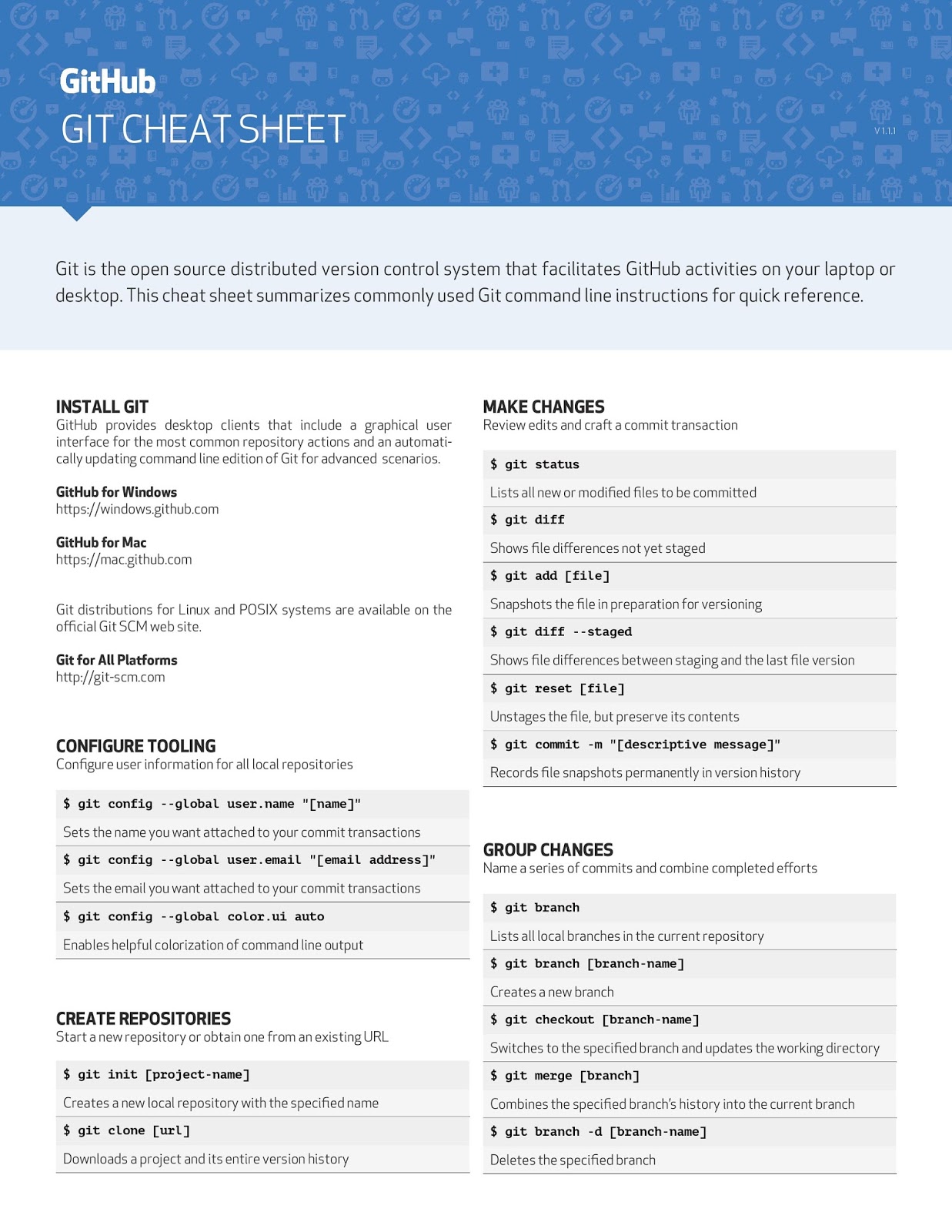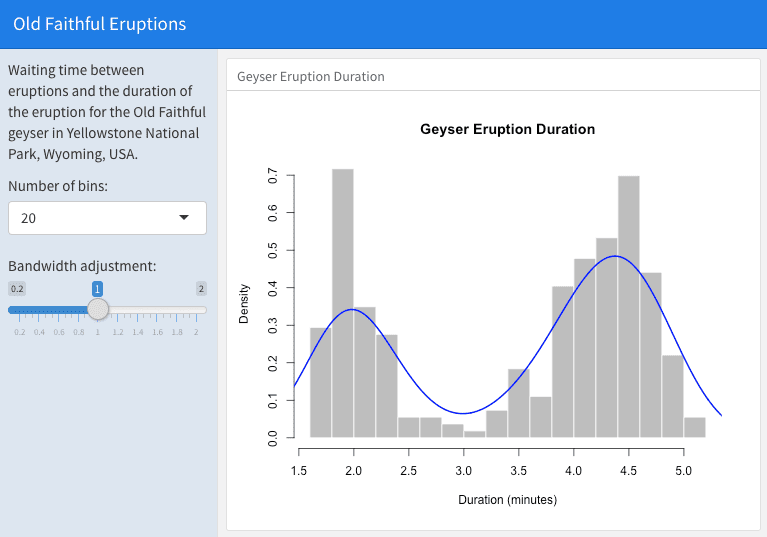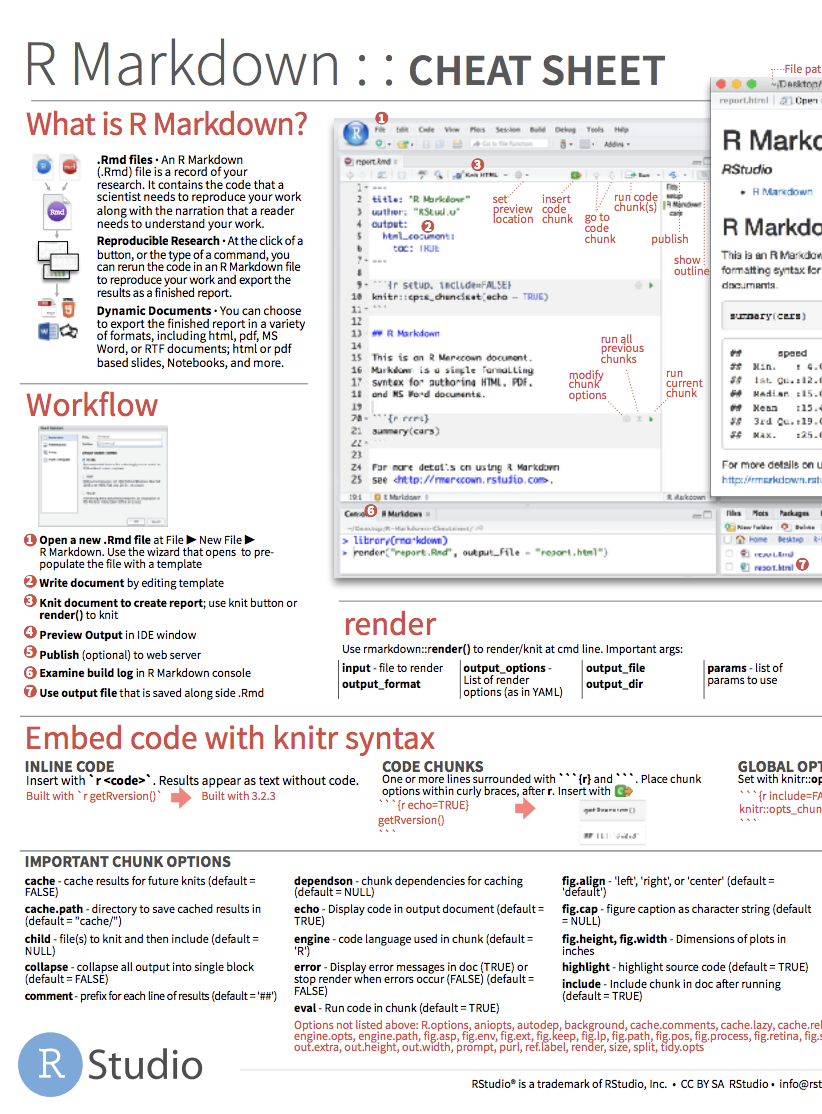From adam-p/markdown-here
- Markdown Cheat Sheet
- Printable Markdown Cheat Sheet
- Markdown Cheat Sheet Python
- Markdown Cheat Sheet Jupyter
- Markdown Cheat Sheet Github
This Markdown cheat sheet provides a quick overview of all the Markdown syntax elements. It can’t cover every edge case, so if you need more information about any of these elements, refer to the reference guides for basic syntax and extended syntax. The one-page guide to Markdown: usage, examples, links, snippets, and more.
Table of Contents
Headers
Emphasis
Lists
Links
Images
Code and Syntax Highlighting
Tables
Blockquotes
Inline HTML
Horizontal Rule
Line Breaks
Youtube videos
Headers
H2
H3
H4
H5
H6
Alternatively, for H1 and H2, an underline-ish style:

Alt-H2
Emphasis
Emphasis, aka italics, with asterisks or underscores.
Strong emphasis, aka bold, with asterisks or underscores.
Combined emphasis with asterisks and underscores.
Strikethrough uses two tildes. Scratch this.
Lists
(In this example, leading and trailing spaces are shown with with dots: ⋅)

- First ordered list item
- Another item
- Unordered sub-list.
- Actual numbers don’t matter, just that it’s a number
- Ordered sub-list
And another item.
You can have properly indented paragraphs within list items. Notice the blank line above, and the leading spaces (at least one, but we’ll use three here to also align the raw Markdown).
To have a line break without a paragraph, you will need to use two trailing spaces.
Note that this line is separate, but within the same paragraph.
(This is contrary to the typical GFM line break behaviour, where trailing spaces are not required.)
- Unordered list can use asterisks
- Or minuses
- Or pluses
Links
There are two ways to create links.
Or leave it empty and use the link text itself.
URLs and URLs in angle brackets will automatically get turned into links.http://www.example.com or http://www.example.com and sometimesexample.com (but not on Github, for example).
Some text to show that the reference links can follow later.
Images
Here’s our logo (hover to see the title text):
Inline-style:
Rod wave deezer. Reference-style:
Code and Syntax Highlighting
Code blocks are part of the Markdown spec, but syntax highlighting isn’t. However, many renderers – like Github’s and Markdown Here – support syntax highlighting. Which languages are supported and how those language names should be written will vary from renderer to renderer. Markdown Here supports highlighting for dozens of languages (and not-really-languages, like diffs and HTTP headers); to see the complete list, and how to write the language names, see the highlight.js demo page.
Inline code has back-ticks around it.
Markdown Cheat Sheet
Blocks of code are either fenced by lines with three back-ticks ```, or are indented with four spaces. I recommend only using the fenced code blocks – they’re easier and only they support syntax highlighting.
Tables
Tables aren’t part of the core Markdown spec, but they are part of GFM and Markdown Here supports them. They are an easy way of adding tables to your email – a task that would otherwise require copy-pasting from another application.
Colons can be used to align columns.
| Tables | Are | Cool |
|---|---|---|
| col 3 is | right-aligned | $1600 |
| col 2 is | centered | $12 |
| zebra stripes | are neat | $1 |
| There must be at least 3 dashes separating each header cell. The outer pipes ( | ) are optional, and you don’t need to make the raw Markdown line up prettily. You can also use inline Markdown. |
| Markdown | Less | Pretty |
|---|---|---|
| Still | renders | nicely |
| 1 | 2 | 3 |
Blockquotes
Blockquotes are very handy in email to emulate reply text.This line is part of the same quote.
Quote break.
This is a very long line that will still be quoted properly when it wraps. Oh boy let’s keep writing to make sure this is long enough to actually wrap for everyone. Oh, you can putMarkdown into a blockquote.

Inline HTML
You can also use raw HTML in your Markdown, and it’ll mostly work pretty well.
- Definition list
- Is something people use sometimes.
- Markdown in HTML
- Does *not* work **very** well. Use HTML tags.
Horizontal Rule
Three or more…
Hyphens
Asterisks
Underscores
Line Breaks
My basic recommendation for learning how line breaks work is to experiment and discover – hit <Enter> once (i.e., insert one newline), then hit it twice (i.e., insert two newlines), see what happens. You’ll soon learn to get what you want. “Markdown Toggle” is your friend.
Here are some things to try out:
Here’s a line for us to start with.
This line is separated from the one above by two newlines, so it will be a separate paragraph.
This line is also begins a separate paragraph, but…
This line is only separated by a single newline, so it’s a separate line in the same paragraph.
(Technical note: Markdown Here uses GFM line breaks, so there’s no need to use MD’s two-space line breaks.)
Printable Markdown Cheat Sheet
Youtube videos
They can’t be added directly but you can add an image with a link to the video like this:
Or, in pure Markdown, but losing the image sizing and border:
Referencing a bug by #bugID in your git commit links it to the slip. For example #1.
License: CC-BY
Markdown
Markdown Cheat Sheet Python
Paragraphs
Separate paragraphs with a blank line.
Start each heading with one or more hashes, followed by a space.
Download adobe xd 2018 mac torrent.
*— ItalicWrap the words in single asterisks.
Wrap the words in double asterisks.
-— Unordered listStart each line with a dash and a space.
Indent before the dash for nested lists.
Start each line with a number, period & space.
Indent before the number for nested lists.
[]()— Link[]— link text inside square brackets.()— link URL inside round brackets.
Start with an exclamation point.
[]— alt text inside square brackets.()— image URL inside round brackets.
---— Horizontal ruleThree consecutive dashes on a single line.
Surround code inside other text with single backticks.
```— Code blockStart a line with three backticks to make a code block.
End the code block with three more backticks on their own line.
Optionally specify the code language after the opening backticks.
Non standard. Start a list and used square brackets with a space to denote a task.
Put an “x” between the square brackets to mark it as complete.
Markdown Cheat Sheet Jupyter
YAML
Always indent with two spaces.
Markdown Cheat Sheet Github
Start with a term, no spaces, followed by a colon and a space.
Indent to create nested objects.
Use Amazon Alexa with Todoist Manage your Todoist tasks on any Amazon Echo device hands-free with a little help from Alexa. With voice commands, you can ask Alexa to add new tasks to your Todoist. Use Amazon Alexa with Todoist Manage your Todoist tasks on any Amazon Echo device hands-free with a little help from Alexa. With voice commands, you can ask Alexa to add new tasks to your Todoist, update your shopping list, or read out the tasks on your lists. Todoist alexa skill. Manage your Todoist tasks on any Amazon Echo device hands-free with a little help from Alexa — the voice-controlled Amazon assistant that turns your words into actions. With simple voice commands, you can ask Alexa to add new tasks to your Todoist, update.
- value— ArraysStart with a dash, and a space.
Arrays inside objects:
Objects inside arrays.
Surround text with quotes (double or single) to escape text.
In all the previous examples the quotes aren’t really necessary. But I find myself almost always adding them for clarity and to prevent myself from having to think about whether I need to escape the or not.
>— Folded text blockStart with a greater than, and indent the next lines.
The text will be collapsed into a single line when parsed.
Start with a vertical pipe, and indent the next lines.
The text will keep its multiple lines when parsed.
---— Front matterYAML can be used at the top of Markdown documents to add more structured data.
Surround the YAML with two lines of consecutive dashes.
